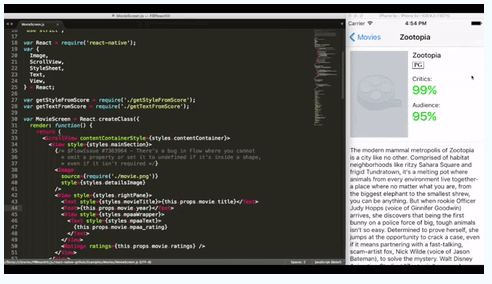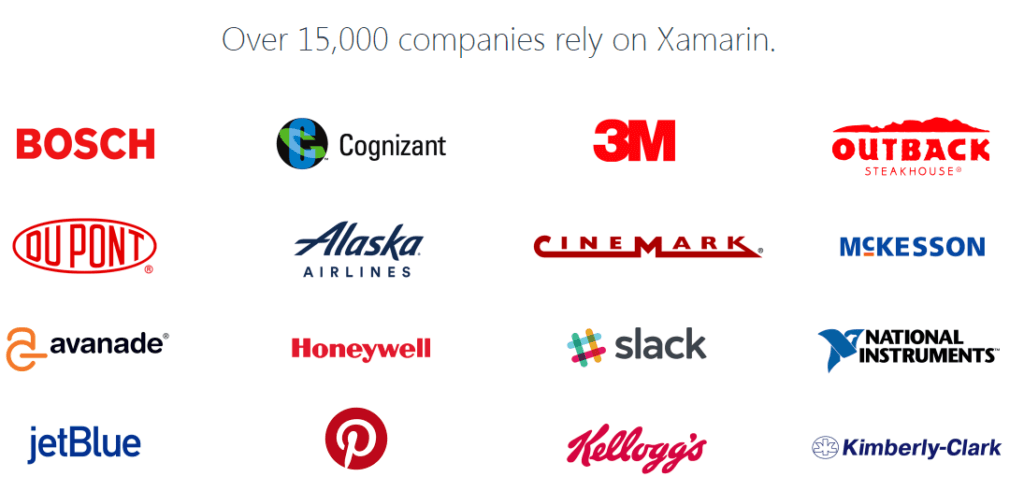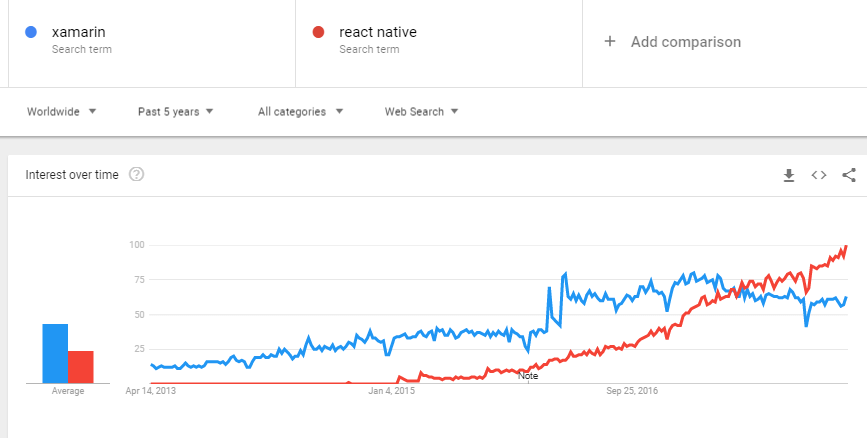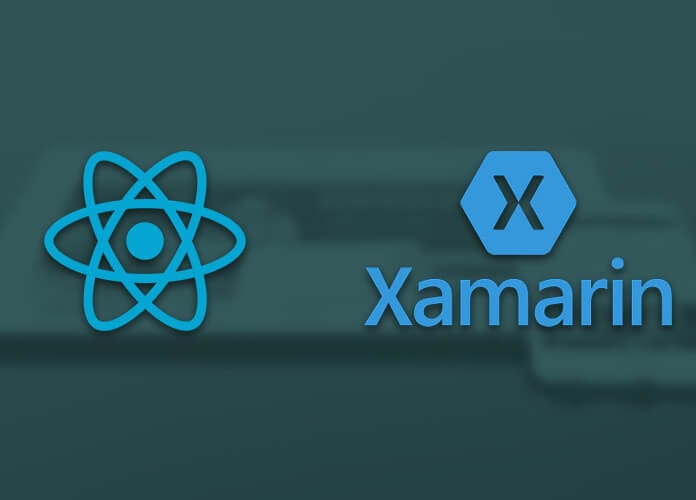There are many ways to build a mobile app – easy and difficult ones. There are tools that allow you to build mobile apps easily, without spending too much time. But will these easy tools give you the best results? Xamarin vs React Native: Best Framework For Your Next App
The overall quality of a mobile app is of utmost importance. We can’t sacrifice quality just because we can quickly and easily complete a mobile app project.
On the other hand, you may not want to spend a huge amount of time and money building an app. Rather, we need tools that allow us to develop great quality mobile apps without spending too much time.
Actually, development time and product quality are not the only factors that we should consider while choosing a mobile app development framework. There are other important factors like development environment, community support, and so on.
Xamarin and React Native are two hot and trending technologies for cross-platform mobile app development. But which one should you choose? Which tool is best for your business?
In this comparative guide, I will discuss with you the most important factors that you should consider while choosing between Xamarin and React Native for your next mobile app.
Xamarin vs React Native – Comparison Guide
General Overview
Xamarin:
Xamarin by Microsoft is an open-source, mobile app development software. You can build Android, iOS, and Windows apps using this tool. In Xamarin, you have to write code in C#.
Official site: https://www.xamarin.com
React Native:
React Native by Facebook is also an open-source mobile app development tool that lets you build mobile apps for Android, iOS, and Windows. In React Native, you have to write code in JavaScript and React.
Official site: https://facebook.github.io/react-native/
Development Environment
Xamarin:

For Xamarin, the only development environment you have is Visual Studio. Although there are other options, Visual Studio is the only suitable platform. It’s inconvenient to use Xamarin in other development environments. You can download Visual Studio with Xamarin from this link.
React Native:

React Native lets you develop mobile apps using different IDEs and text editors such as Atom, Sublime Text, Visual Studio Code, Vim Editor, Nuclide, Spacemacs Editor, Deco IDE, TextMate Editor, and so on. There is so much flexibility. You can choose from several text editors and IDEs. For your mobile app development project, select the one that you like the most.
Development Time And Ease Of Use
Xamarin:
We just discussed that the only suitable development environment we have for Xamarin is Visual Studio, which means that there is not much flexibility. But you have to keep in mind that this is an awesome IDE with useful features, which makes the life of a developer a lot easier.
You can finish your app project faster using controls and layouts provided in Xamarin.forms.
In Visual Studio, you get all the development tools in one place, which speeds up your mobile app development process.
React Native:
When you make some modifications in your code, you don’t need to recompile your code. Using the Hot Reloading feature in React Native, you can reload your app instantly without recompiling. This feature saves you a ton of time while in Visual Studio, you have to compile each and every time you make changes in your code.
Besides, the pre-built components in React Native let you complete your projects faster.
Performance
Xamarin: Xamarin gives you near-native performance by using platform-specific hardware acceleration. You can’t achieve this kind of performance with platforms where the code is interpreted at runtime.
React Native: When you’re building a mobile app using React Native, you’re not building an HTML5 app, a mobile web app, or a hybrid app. Rather, you’re building a real mobile app that will be fast enough. React Native lets you use native code. For a better performance, you can also build a part of your application using native code.
Market share
Xamarin:

According to Xamarin.com, more than 15,000 companies use this platform. Top companies that use Xamarin are Cognizant, BOSCH, 3M, Honeywell, slack, JetBlue, etc.
React Native:

A great number of companies including Fortune 500 companies are using React Native. This framework has been used in apps like Facebook, F8, Instagram, Skype, Facebook Ads Manager, Skype, Airbnb, Tesla, Walmart, Bloomberg, Chop, Artsy, Discord, SoundCloud Pulse, and so on.
Both of these tools have a great market share.

Community support
Xamarin:
Xamarin has been there for quite a long time. So there’s a good community support and assistance available for this platform.
A great number of blog posts and tutorials have been written about Xamarin and there are a huge number of questions and answers about Xamarin on Q&A sites like StackOverflow. So if you get stuck somewhere while coding in Xamarin, you will most probably find relevant information on the Internet to solve your problem.
React Native:
React native is comparatively a new framework. So there’s a small amount of information available about it on the Internet. But if you face any problems or have any questions, you can get reliable answers by asking questions on Q&A sites and forums.
Comparison summary
|
Criteria |
Xamarin |
React Native |
|
General overview |
It’s a cross-platform mobile app development tool from Microsoft. You have to write code in C#. |
It’s a cross-platform mobile app development tool from Facebook. You have to write code in JavaScript and React. |
|
Development environment |
Visual Studio |
Any text editor such as Sublime Text and Atom. |
|
Development time and ease of use |
Reasonable |
Reasonable |
|
Performance |
Near-native performance |
Near-native performance |
|
Market share |
More than 15,000 companies use this tool. |
Top companies including Fortune 500 companies use this tool. |
|
Community supports |
Good |
Not so good, but it’s improving. |
Pros and cons of Xamarin
Pros:
• Near-native performance
• Shared code: If you’re building an app for multiple platforms (like Android, iOS, etc.), you can reuse most of your code in your app for the other platforms.
• Great community support
• Native user interfaces
• Access to native API: You can get platform-specific functionalities in your app
• Several controls and layouts provided in Xamarin.Forms to speed up the development process
• Faster app development with NuGet and Xamarin plugins
Cons:
• Licensing cost: As the business license cost starts at $999, it will be hard for many companies to afford it. Without purchasing a business package, you won’t
be able to create multiple accounts for your developers. So, it will be difficult for your developers to work together on a project.
• Slower than native apps: With Xamarin, you can achieve high performance. But apps built with Xamarin will not be faster than native Android apps built with Java and native iOS apps built with Objective-C and Swift.
Pros and cons of React Native
Pros:
• Near-native performance
• Flexibility of text editors
• Hot Reload: You can reload your app instantly, without recompiling.
• Direct use of native code: You can use both, React Native and native code to optimize your app to a great level.
• Code sharing
• Faster app development with pre-built components
• Access to native functionalities like camera, accelerometer, etc.
• High-quality mobile UI
Cons:
• Navigation issues: The navigation of your mobile app will not be as good as native navigation. A navigation designed using React Native is not that smooth.
• Slower than native apps: Like Xamarin, React Native also lets you develop high-performance apps. But apps built with React Native will not be faster than native Android apps built with Java and native iOS apps built with Objective-C and Swift.
So which one is better?
I don’t have a straightforward answer to this question because both of these frameworks are really great, have impressive features, and help you develop high-quality apps in less time. In this article, I have discussed several factors with you such as development environments, performance, etc. Now taking all the important factors into consideration, you have to decide which one might work best for you!
Which framework would be the right fit for your next mobile app? And why? Let us know in the comments section.




Completely disagree with you in terms of community support, RN community is vibrant and overwhelmingly stronger. And there is way more articles and learning options than for xamarin. Plus, they are of much better quality.
Leaving lots of info in this article